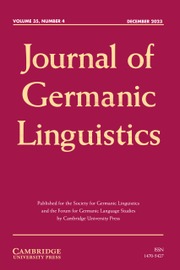Article contents
Binding by Phase: (Non-)Complementarity in German
Published online by Cambridge University Press: 01 June 2004
Abstract
This paper explores areas of reflexive and pronominal noncomplementarity in German Accusativus cum Infinitivo (AcI)-constructions and other configurations that involve embedding of a subclausal (smaller than IP) constituent. The main empirical finding is that there are several non-complementarity-inducing contexts that have not been noticed before. In examples with embedded AcIs or complex DPs, a reflexive may be bound across an intervening subject, and a pronominal may be free even if its antecedent is only a vP-, DP-, or PPboundary away. The proposed account of these facts is based on the claim that vP, DP, and PP are all potentially phase-defining categories (Chomsky 2000). The expected “regular” cases of complementarity are accounted for by postulating as the relevant binding domain for both reflexive and pronominal the minimal phase containing the anaphoric element. Newly discovered cases of non-complementarity that exist at least for some speakers stem from the ability of reflexives, but not pronominals, to covertly raise to the edge of their phase (Safir 2004). Finally, well known cases of non-complementarity in AcIs where the anaphoric element is embedded in a PP can be explained if θ-independent (that is, internally saturated) PPs are adjoined high, to the AcI (vP)-phase-edge. This then achieves a unified account of both the well established binding facts documented in the literature and the surprising long-distance binding of reflexives reported as acceptable for some speakers.My thanks to Judith Aissen, Jorge Hankamer, and especially Jim McCloskey, who have helped me with and greatly contributed to the various drafts of this paper. Thanks also to my JGL reviewers for their helpful feedback. (Any remaining errors are my own.) Finally, I am indebted to all my native speaker consultants.
- Type
- ARTICLES
- Information
- Copyright
- © 2004 Society for Germanic Linguistics
References
- 15
- Cited by




